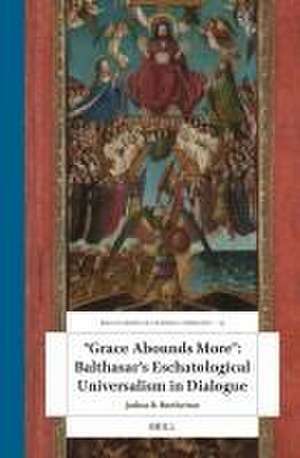“Grace Abounds More”: Balthasar’s Eschatological Universalism in Dialogue: Brill's Studies in Catholic Theology, cartea 13
Autor Joshua R. Brothertonen Limba Engleză Hardback – 5 dec 2023
Preț: 610.42 lei
Preț vechi: 744.41 lei
-18% Nou
Puncte Express: 916
Preț estimativ în valută:
116.80€ • 122.28$ • 96.65£
116.80€ • 122.28$ • 96.65£
Carte indisponibilă temporar
Doresc să fiu notificat când acest titlu va fi disponibil:
Se trimite...
Preluare comenzi: 021 569.72.76
Specificații
ISBN-13: 9789004681668
ISBN-10: 9004681663
Dimensiuni: 155 x 235 mm
Greutate: 0 kg
Editura: Brill
Colecția Brill
Seria Brill's Studies in Catholic Theology
ISBN-10: 9004681663
Dimensiuni: 155 x 235 mm
Greutate: 0 kg
Editura: Brill
Colecția Brill
Seria Brill's Studies in Catholic Theology
Notă biografică
Joshua R. Brotherton, Ph.D. (2015), Catholic University of America, is Adjunct Professor at St Thomas University, Miami, US. and has published many academic articles and one monograph, One of the Trinity Has Suffered: Balthasar’s Theology of Divine Suffering in Dialogue (Emmaus Academic, 2020).
Cuprins
Acknowledgements
Credits
Introduction: The Fact of Balthasar’s Subjunctive Universalism and Its Presuppositions
1 The Crux of Balthasar’s Eschatology: What is Balthasar’s “Controversial” Hope?
2 Presuppositions of Balthasar’s Hope: The Framework
1 Theodramatic Hope for Universal Salvation: Suspension of Judgment
1 Commentary on Balthasar’s Interpretation of Revelation
2 Ralph Martin’s Critique
3 Edward Oakes’ Response
4 Grisez and Ryan
5 Towards a Resolution: Suspension of Judgment
6 Excursus on Judas and Ratzinger
2 The “Mechanics” of Universal Salvation: The Possibility of Universal Conversion in Death
1 The Possibility of Universal Conversion
2 The Possibility of Conversion in Death
3 Hell as Self-Annihilation
4 Hope for Universal Conversion in Death
5 Conclusion
3 The Possibility of Refusing Grace: Freedom and Predestinarianism
1 Universalistic Theodrama and the Problem of Evil
2 Balthasar’s Inherited Augustinian Framework in the Theology of Grace
3 Tracing Balthasar’s Treatment of Grace and Freedom
4 Perspectives on Finite Freedom
5 Universal Hope and Predestination
6 Christocentrism and the Ghost of Barthian Augustinianism in Balthasarian Theology
7 Conclusion
4 The Desiderium Naturale and Theological Hope
1 Balthasar on the Nature – Grace Problematic
2 Balthasar’s Argument from Theological Hope
3 The Lonergan-Maritain Alternative
4 Potential Eschatological Implications
5 Conclusion
5 An Eschatological Alternative to Universalism in Light of the Theology of Grace
1 Maritain Answers the Balthasarian Dilemma
2 Challenges to Maritain’s Proposal
3 An Alternative to Balthasar’s Universalism
4 Another Theodramatic Eschatology?
5 Conclusion
6 Going Beyond Balthasar: The Universalist Rationalization of Evil
1 The Problem of Freedom in the Universalist Framework
2 Bulgakov’s Influence on Balthasar
3 Philosophical Influences on Bulgakov’s Sophiology
4 An Assessment of Bulgakov’s Eschatology
5 Bulgakov and Balthasar Contrasted
6 Conclusion
7 Excursus: Review of David Bentley Hart’s “That All Shall Be Saved”
Conclusion: Reclaiming Balthasar’s Theodramatic Eschatology?
Bibliography
Index
Credits
Introduction: The Fact of Balthasar’s Subjunctive Universalism and Its Presuppositions
1 The Crux of Balthasar’s Eschatology: What is Balthasar’s “Controversial” Hope?
2 Presuppositions of Balthasar’s Hope: The Framework
Part 1: Balthasar’s Hope: Interpretation and Speculation
1 Theodramatic Hope for Universal Salvation: Suspension of Judgment
1 Commentary on Balthasar’s Interpretation of Revelation
2 Ralph Martin’s Critique
3 Edward Oakes’ Response
4 Grisez and Ryan
5 Towards a Resolution: Suspension of Judgment
6 Excursus on Judas and Ratzinger
2 The “Mechanics” of Universal Salvation: The Possibility of Universal Conversion in Death
1 The Possibility of Universal Conversion
2 The Possibility of Conversion in Death
3 Hell as Self-Annihilation
4 Hope for Universal Conversion in Death
5 Conclusion
Part 2: Behind the Presuppositions of Balthasarian Hope
3 The Possibility of Refusing Grace: Freedom and Predestinarianism
1 Universalistic Theodrama and the Problem of Evil
2 Balthasar’s Inherited Augustinian Framework in the Theology of Grace
3 Tracing Balthasar’s Treatment of Grace and Freedom
4 Perspectives on Finite Freedom
5 Universal Hope and Predestination
6 Christocentrism and the Ghost of Barthian Augustinianism in Balthasarian Theology
7 Conclusion
4 The Desiderium Naturale and Theological Hope
1 Balthasar on the Nature – Grace Problematic
2 Balthasar’s Argument from Theological Hope
3 The Lonergan-Maritain Alternative
4 Potential Eschatological Implications
5 Conclusion
Part 3: Towards a Resolution to Balthasar’s Aporia
5 An Eschatological Alternative to Universalism in Light of the Theology of Grace
1 Maritain Answers the Balthasarian Dilemma
2 Challenges to Maritain’s Proposal
3 An Alternative to Balthasar’s Universalism
4 Another Theodramatic Eschatology?
5 Conclusion
6 Going Beyond Balthasar: The Universalist Rationalization of Evil
1 The Problem of Freedom in the Universalist Framework
2 Bulgakov’s Influence on Balthasar
3 Philosophical Influences on Bulgakov’s Sophiology
4 An Assessment of Bulgakov’s Eschatology
5 Bulgakov and Balthasar Contrasted
6 Conclusion
7 Excursus: Review of David Bentley Hart’s “That All Shall Be Saved”
Conclusion: Reclaiming Balthasar’s Theodramatic Eschatology?
Bibliography
Index










